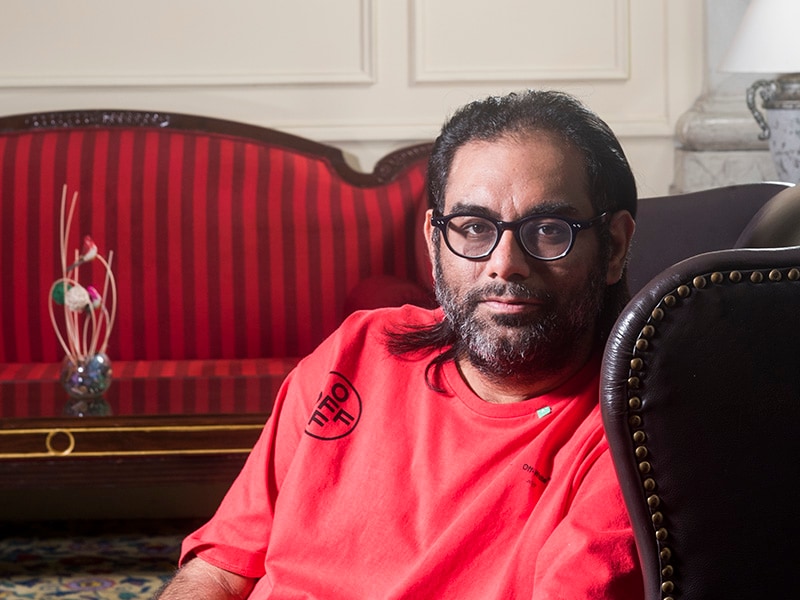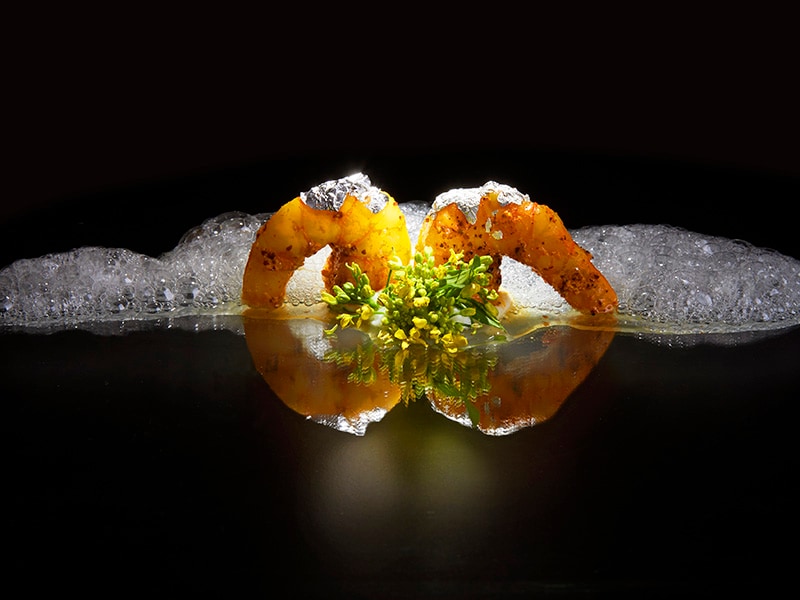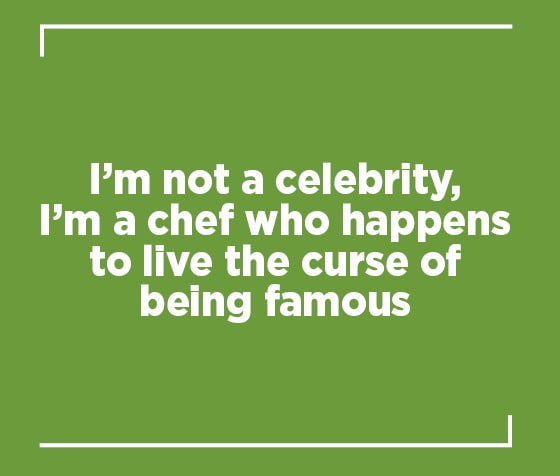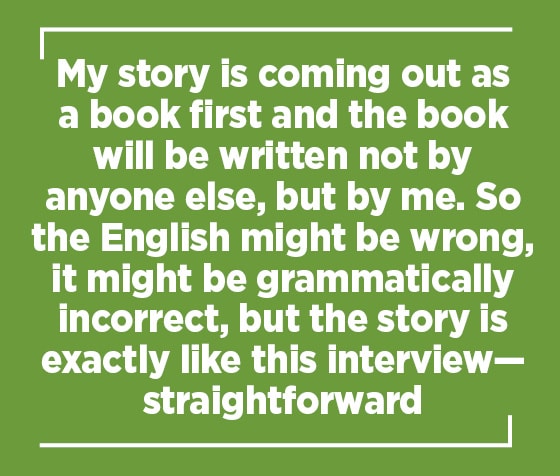If Gaggan Anand was playing cricket for India, you could count on him to call it a day well before the should-he-shouldn’t-he debate would have dogged his illustrious career. Anand, the rockstar chef who makes liquid nitrogen talk at his multi-hatted progressive Indian restaurant in Bangkok, is shutting down the eponymous eatery in June 2020. Next, he will open up an exclusive, three-days-a-week, six-months-a-year 16-seater with chef Takeshi “Goh” Fukayama in Fukoka, Japan, a country that he claims to have visited 83 times in four or five years. “I don’t know what sort of food it’ll have. But it won’t be what I’m doing now,” Anand tells Forbes India in Mumbai, one of his four stops for a pop-up—christened the ‘Last Experience of Gaggan’–in association with ITC Hotels.
But that’s two and a half years after Gaggan shuts down. Before that, he’s going to plan a bit but also enjoy his well-deserved break from a journey that began in the middle of a drinking binge in the mid-noughties to prove to an Australian colleague that Indian food wasn’t just about bread and curry and culminated in a restaurant that has been voted as Asia’s best four times in a row, with two Michelin stars on the guide’s debut in Thailand. Anand confirms that he won’t cook outside his kitchen till the closing, once this series of pop-ups is over. Even if that means he has to say no to A-list weddings in India. “I love saying no to Indians,” he says, “The richest of the families wants us to cook for them and I say no. Everybody thinks the last cheque I’ll take in my life is a blank cheque. Never in my life. Never.”
I’m off to Japan, then, and will start again in 2.5 years, on a more refined journey. This new restaurant will not be for the masses. It’ll be an exclusive 16-seater restaurant, and it won’t be what I’m doing now.![g_112615_bhel_sandwich_sm_280x210.jpg g_112615_bhel_sandwich_sm_280x210.jpg]() Bombay bhel sandwich
Bombay bhel sandwich
Q. Why Japan?
I’ve been to Japan 83 times in four or five years now, and I find that even that isn’t enough to feed my inspiration. It’s been a very easy decision for me. It’ll take me 2.5 years to put this restaurant together. Sometimes, you do things for money, and when you have the money, you do it for the art. I have the money now, and I want to do this project for the sheer art of it. My dreams are not money-driven, but you do need money to make these dreams come true—it’s time that I make my dream restaurant come true.
Q. You’ve mentioned in interviews that because of your fame and the rush to eat at your restaurant, you regret not meeting diners enough. Your Fukoka restaurant, a 16-seater, will make you even more exclusive. Is it a conscious decision and why?
It is. I think, in Gaggan, many people come to cross it off their checklist. The minute they see me, they want to take a photo—I tell them they can only take a photo after their meal. It’s like everyone goes for a concert knowing the band’s four greatest hits, but they don’t know the band’s favourite songs, when they played or how they played them. I don’t want people to come for my greatest hits or for me—I want them to come for the food experience. I want to change fine dining forever for the world.
In Japan, you’ll have to stay at the hotel I make to be able to eat in my restaurant. It won’t be about the money, but each diner will be interviewed beforehand. That’s how exclusive it will be. We will be doing 260 seats a month at Gaggan, I do 260 seats in a single weekend. You won’t even eat my food on the first day. The first night you come, we’ll hang out, have a drink, have some fun. Then the next night will be the dinner. And it will be incredible.
I can’t say what exactly the menu will be, but it will be Japanese-Indian inspired, along with chef Goh. Like yin and yang. Have two chefs ever closed two restaurants to open one that’s smaller than both? We’re idiots, both Goh and Gaggan [laughs]. It’s suicidal, and maximum suicides happen in Japan. I want to create the world’s most inaccessible restaurant—that’s my dream.![g_112619_blurbs-gaggan2_280x210.jpg g_112619_blurbs-gaggan2_280x210.jpg]() Q. Do you think molecular gastronomy is a fad?
Q. Do you think molecular gastronomy is a fad?
Chefs in India don’t understand what molecular is. A diner in Delhi had a hole burned in his stomach because a chef used liquid nitrogen the wrong way—and then India banned liquid nitrogen for everyone. Tomorrow, if a gas cylinder explodes, will we ban them altogether? Chefs don’t want to understand the science of molecular gastronomy. The frying oil needs to be at a specific temperature. A thermometer needs to be in the oil at all times—if it goes 1 degree up or down, we’ll stop it. We saw the science of the molecule and perfected it to make the best, tastiest version for you.
What we do at our restaurant is not called molecular, but modern gastronomy. Liquid nitrogen has to be used to attain certain textures. In India, there’s little awareness. It’s the same as when an idiot drives a Lamborghini and bashes people up. Is the Lamborghini at fault?
Q. How do you separate the celebrity from the chef?
I’m not a celebrity, I’m a chef who happens to live the curse of being famous. A celebrity will worry about how they look and what they wear [points at his patterned shorts and bright red Off-White T-shirt]. In India, we make heroes out of anyone. In fact, some of the most famous Indian chefs don’t even have a restaurant. Many Indian chefs don’t make it to big lists because they themselves don’t believe in their cooking—they spend less and less time doing the actual cooking themselves. I think of myself as a normal person in Bangkok, and I cook every single day.![g_112617_dabb_chigali_sm_280x210.jpg g_112617_dabb_chigali_sm_280x210.jpg]() Dabb ChigaliQ. What are some trends we can expect to see in Indian food?
Dabb ChigaliQ. What are some trends we can expect to see in Indian food?
I don’t know about trends, but I hope someone comes up with well-presented Bengali food. I wish Gujarati food doesn’t end up as just farsan. I wish that phulka becomes a recognised Indian bread outside of India, and not naan. I wish that we glorify our aachar as a fermented product people now celebrate the ‘fermented’ process just because it’s a Noma technique, not knowing we’ve been doing it for generations in our homes. Sab roti chawal achaar kha ke aaaye hai, but now they want to ferment things because it’s trendy.
Q. Even a restaurant like elBulli ran at a loss for years and had to shut down eventually. What does it take for a restaurant to make money?
That’s the lesson I learnt from elBulli, not molecular gastronomy. What I wanted to learn was what it takes to become elBulli—today, I am elBulli. I learnt that it takes determination, and you need to get the best out of the people around you, know everyone’s strengths and constantly make your team stronger. The guy who does frying, I will allow him only to fry in my kitchen. There will be no overlap. We have a Russian girl who is a terrible cook, but I hired her because she’s artistic and imaginative—she makes our dishes look great. Everyone gave up on her, but I asked her to come cook with me. In six months, she’ll go from a rabbit to a tigress.
Q. How do you harness the power of social media?
My popularity shot up because of being featured on the Netflix show Chef’s Table [in 2016]. My Instagram following rocketed after that. We did a pop-up in LA after that, which sold out in 28 seconds there were 1,200 people on the waiting list.
I don’t pay too much attention to social media though. Many Indian so-called foodies buy likes. I’m focused on creating something that could make a New Yorker come to my city just to eat at my restaurant. ![g_112621_gaggan_anand_280x210.jpg g_112621_gaggan_anand_280x210.jpg]() Q. Your dishes have been replicated all over the country…does that annoy you? Do you think chefs need to be able to protect their intellectual property?
Q. Your dishes have been replicated all over the country…does that annoy you? Do you think chefs need to be able to protect their intellectual property?
No. Isn’t that the best form of flattery? I’m happy to go tell these chefs who have copied me when they’re doing something wrong. Every street has a copy of Mona Lisa—but that doesn’t make the Mona Lisa any less valuable. That’s why I’m starting a cooking school. I don’t know when, but I will, and I’ll teach them the right way to go about molecular gastronomy.
Q. The last time we spoke you mentioned that you follow ‘my restaurant my rules’ when it comes to the integrity of food. You decide how diners eat, and you demand that they eat certain dishes with their hands, for instance…
We spoke a few years ago. Now, we ask guests to eat 22 courses by hand. It’s embarrassing to see someone eat dosa with a fork. On my team, we’re all from different countries, and they’ve learnt to eat with hands. When you go to China, you eat with chopsticks. Eating with our hands is in our culture.
Q. In a world where restaurant brands rapidly are moving towards pleasing the consumer, you’ve been able to stick to your own rules. How?
Because I don’t have any marketing brand imprinted on my T-shirt. I can call my own shots. I’ll die hungry but I won’t hold a ketchup bottle endorsement in my hand. Sometimes, I wish I was commercial—my wife would have got more bling rings. But it’s not something I will ever do.
Q. What are the challenges and risks associated with the form of experimental cooking you do?
Certain dishes come exactly the way you want, and others have to keep going back to R&D. Now, Gaggan’s become like a game we like to play and have fun with.
We use liquid nitrogen for a bitter coffee and chocolate dessert called ‘Dark Side of the Moon’, where we make a beautiful moon structure. We can’t do this in India because of this country’s new liquid nitrogen rules. So India misses one of our best desserts. That’s why I can’t open a restaurant in India. People here don’t understand gastronomy. I can’t do my best dishes here.
Q. You have said a film could be made on your life. What would you say is the essence of your story, and who would you like to play Gaggan in the film?
I’ve had offers. My story is coming out as a book first and the book will be written not by anyone else, but by me. So the English might be wrong, it might be grammatically incorrect, but the story is exactly like this interview—straightforward. That’s why I’ve not signed with a publisher. It’ll be online for free, and available on the last day of my restaurant. I’ll close the cashier and hand out the book. And then I’ll use that book as the base if someone wants to make a movie, so that they don’t imagine my story. In fact, with respect the filmmakers who approached me, the way they explained the story was so wrong, I said ‘bye bye’. They come to me saying ‘We’ll make a Rs 100-cr film’. That’s not what this is about.
I would love for Aamir Khan to play me, but he’s too good looking. Or Irrfan. I see him as me. I have a movie that could become Slumdog Millionaire. My movie is destined to be Hollywood-borne. That’s how I look at it.![g_112623_book_on_gagan_280x210.jpg g_112623_book_on_gagan_280x210.jpg]() Q. What are some of the unexplored areas for you? What newer ingredients, modes of cooking would you like to take on in future?
Q. What are some of the unexplored areas for you? What newer ingredients, modes of cooking would you like to take on in future?
Right now, I’m very focused on closing Gaggan properly, and enjoying every day as it closes. I’m very emotional about it and want to make the most of it. Then, I want to relax, because the last few months will be really hectic, with a lot of media attention and everyone scrambling for the last table. In fact, I plan to keep the last two months by invite only.
Q. What is the legacy you think Gaggan leaves?
Gaggan’s legacy will be its memory. Those who got it, did, and those who didn’t, didn’t [smiles].
Q. Aren’t you afraid of starting from scratch again?
I’m not afraid of the challenge—when you’re good at something, you’ll always be good at it. I hope we don’t chase after awards. The next restaurant will be award-less we won’t accept any awards.
Q. You’ve received two Michelin stars in the newest version of the guide. What does this sort of recognition mean to you?
My car still has Pirelli tyres [shrugs]. As an Indian chef, I am being judged by a French chef and a couple of local Asian inspectors, who don’t understand our cuisine. Will a French chef allow an MRF or a Ceat to have Indian inspectors judge French cuisine? I don’t ridicule them—I would go for the awards, but getting the three stars is not my mission. I’m not cooking for them. Where is the difference between [Bangkok-based] chef Garima Arora, and a hawker who puts chicken and rice on a plate, who have both been awarded one star? How can we justify that? I told Garima when she got her star that her curse has begun. Now, everyone will hold you to that star, and your every mistake will be over-analysed. Thank God I was never dependent on Michelin—they were dependent on me. They’re in Bangkok because the Bangkok government paid them to be, and I won’t change my tyres.

 Image: Mexy Xavier
Image: Mexy Xavier  Bombay bhel sandwich
Bombay bhel sandwich Q. Do you think molecular gastronomy is a fad?
Q. Do you think molecular gastronomy is a fad? Dabb ChigaliQ. What are some trends we can expect to see in Indian food?
Dabb ChigaliQ. What are some trends we can expect to see in Indian food? Q. Your dishes have been replicated all over the country…does that annoy you? Do you think chefs need to be able to protect their intellectual property?
Q. Your dishes have been replicated all over the country…does that annoy you? Do you think chefs need to be able to protect their intellectual property? Q. What are some of the unexplored areas for you? What newer ingredients, modes of cooking would you like to take on in future?
Q. What are some of the unexplored areas for you? What newer ingredients, modes of cooking would you like to take on in future?